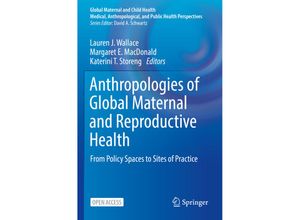This open access edited book brings together new research on the mechanisms by which maternal
and reproductive health policies are formed and implemented in diverse locales around the world
from global policy spaces to sites of practice. The authors - both internationally respected
anthropologists and new voices - demonstrate the value of ethnography and the utility of
reproduction as a lens through which to generate rich insights into professionals' and lay
people's intimate encounters with policy. Authors look closely at core policy debates in the
history of global maternal health across six different continents including: Women's use of
misoprostol for abortion in Burkina Faso The place of traditional birth attendants in global
maternal health Donor-driven maternal health programs in Tanzania Efforts to integrate
qualitative evidence in WHO maternal and child health policy-making Anthropologies of Global
Maternal and Reproductive Health will engage readers interested in critical conversations about
global health policy today. The broad range of foci makes it a valuable resource for teaching
in medical anthropology anthropology of reproduction and interdisciplinary global health
programs. The book will also find readership amongst critical public health scholars health
policy and systems researchers and global public health practitioners.



